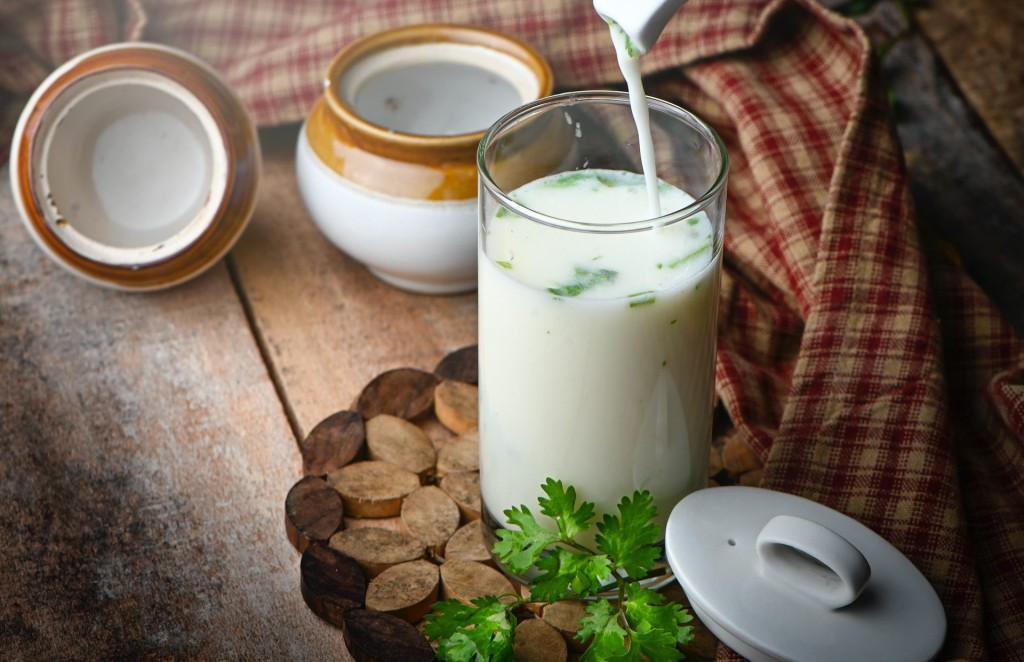An upset stomach is considered to be one of the most common disorders, which can be contracted through a variety of sources. Some of the common symptoms of an upset stomach include nausea, bloating, loose motions, indigestion, and in some cases even vomiting. Though there can be a range of methods of treatment, from simple management at home through home remedies to more severe cases that need medical attention, the curd is usually the first food that comes to mind for consumption in such cases. Let us know why is curd good option for an upset stomach? Is curd good for indigestion too? What are the benefits of curd for an upset stomach? Can curd cure stomach pain?
Thanks its probiotic nature and naturally soothing effect on the stomach, consuming homemade curd is an efficient way to treating an upset stomach irrespective of its underlying cause. Ayurveda too suggests the consumption of a light lassi or chhaas, to soothe an upset tummy. In fact, during the summer months, it is advisable to increase your intake of dahi during the daytime, when temperatures are high. Adding a little salt and zeera further makes the chhaas, digestion-friendly.
Also Read: 13 Natural Health And Beauty Benefits Of Curd/Dahi
Table of Contents
Watch Video – Reasons To have Dahi
5 Basic Reasons that Causes An Upset stomach
However, in order to understand how curd can be useful in treating an upset stomach, we must first understand its causes. Here’s the 5 main cause of an upset stomach.
1. Food Tolerance
As probably known, every human body is different and comes with its own unique strengths and weaknesses. While some people may need milk for their growth needs, or to help them sleep better at night, others may be intolerant to lactose. For them, an intake of some lactose-containing item could result in indigestion. Consuming food that creates an immediate allergic reaction to your body is one of the reasons for an upset tummy.
2. Post Stomach Flu
It is found that an upset stomach can also occur after someone is diagnosed with a severe case of stomach flu. It includes symptoms like nausea and a low-grade fever.
3. Liver and Pancreatic Illnesses
Both liver and pancreas are responsible for secreting important biological juices which further aid in digestion and makes it easier for the intestines to do their work. But, if they have contracted any disease, their function might be impaired and they might not act the same way, which could lead to indigestion.
4. Stress and Anxiety
Most of the people suffering from indigestion have no actual organic cause for their symptoms. It can also be caused by an irregular diet, and in most cases, anxiety has proven to be a major cause of indigestion.
5. Exhaustion and Lack of Sleep
Yet, another symptom of a tired and sleep-deprived body is an upset stomach. Sleep and relaxation are crucial to our existence. When the body is not well-rested and is deprived of quality sleep over large periods of time, it starts affecting our daily body functions. You may feel tired and fatigued, in addition to cramps in the stomach and in some cases even diarrhea and watery stool.
6 Reasons Why Curd is the Best Cure for Indigestion?
As we know, that as per Ayurveda, curd is the best cure for an upset stomach. The benefits of curd for an upset stomach are many. And these work effectively too. Here are the reasons that makes curd a good for indigestion and for an upset stomach.
1. Rich in Probiotic
Curd, being an item rich with probiotic potential, consists of a lactic acid bacterium which further improves lactose digestion, thus making it safe to digest even for people who are lactose intolerant.
The bacterium present in curd when ingested is responsible for shortening the intestinal transit time, which helps in getting rid of the undigested waste.
2. Cures Indigestion
Curd is considered to be good for the treatment of symptoms related to indigestion. It has live cultures (i.e., bacteria) present. Thanks to these live cultures who keep our gut healthy.
Having live cultures present benefits us in curing stomach-related problems such as indigestion and increase our metabolism.
3. Provides Energy
When we look at the nutritional value of curd, we find that curd contains a good amount of carbs. Carbs are digested easily.
Curd once ingested, converts into energy packets after being broken down by digestive enzymes. That energy is utilized by our organs to work properly. Hence, increasing metabolism and curing some stomach-related issues.
4. Relieves against IBS
Irritable Bowel Syndrome may be relieved by consuming curd or curd rice. The specific resistant starch present in it helps in producing the live cultures, which will help in keeping our stomach health good by removing the bad bacteria from it.
This can also help in curing and relieving our digestive track related problems.
5. Cures Constipation
The easily made drink from curd is buttermilk, which when consumed daily after meals can help with the problem causing constipation. The live bacteria present in the curd undoubtedly help to combat the condition which leads to constipation by keeping a healthy gut.
Curd fastens the intestinal activity, which also removes the undigested food and toxic stuck on the intestine linings. This definitely keeps the problem such as stomach or intestinal infection at bay, leading to a good healthy stomach.
6. Helps during Diarrhea
Curd keeps the digestive tract healthy. To increase our stomach strength, it is necessary to keep our stomach environment gut-friendly. To combat diarrhea, have buttermilk 2 or 3 glasses a day.
Consumption of buttermilk will help in keeping you hydrated as diarrhea leads to dehydration. As well as it will also help you by increasing the energy levels.
Related Reading: We review products over days, and sometimes weeks, so you can shop better. Read our Best Packaged Dahi To Buy Review here.
2 Easiest Homemade Curd Dish For An Upset Stomach
Now as we know curd is the ideal go-to option for an upset stomach. But how to eat curd during an upset stomach? We mentioned the 2 easiest homemade curd dishes that are good to have while having upset stomach.
1. Buttermilk

Buttermilk is one of India’s authentic coolers, and it has all the right ingredients that make it a nutritional beverage, especially when one is suffering from an upset stomach.
The steps required for making one serving of flavorful glass of buttermilk are:
- Mix all the ingredients, which include about ¾ cups of curd, along with other ingredients for taste such as black pepper and coriander.
- The next step is to add about ½ cup of cold water to the mixture and stir it well. It should be allowed to set for at least 15 minutes before consumption.
Tip: You can add jeera, crushed or fresh mint leaves, or even a handful of cry leaves (kadi patta) to the blender before churning the buttermilk for a flavor punch.
2. Curd Rice

One of the most common dishes in South Indian households, curd rice is easy to make yet delicious delicacy that contains an adequate amount of nutritional content, in ad
The steps involved in making a delicious plate of curd rice are:
- Boil the rice and allow it to cool down.
- Mix the rice with curd and salt. Stir it well.
- In a pan, add two tablespoons of oil. When the oil is heated, add a few curry leaves, and Urad dal.
- Fry until the dal turns light brown. After this, add the fried mixture to the rice and mix it well.
The other thing to note while serving curd rice is that it is traditionally served cold.
Also Read: How To Set Dahi (Curd) The Right Way
Frequently Asked Questions
Curd is an age-old home cure for stomach illnesses such as diarrhea and acidity. Here are a few interesting FAQs we answered about curd and stomach.
1. Why is curd good for the stomach?
Curd, being probiotic in nature, is good for the stomach. Consuming it maintains gut health, i.e., the balance of the live culture or good bacteria. Curd is also used for cooling the stomach. It has protein and good fats. It is a fine source of micronutrients such as calcium and potassium. Make curd a part of your diet to keep stomach sicknesses at bay.
2. Who should not eat curd?
Curd is made by curdling process from the milk, specifically from cow or buffalo milk. It contains a natural type of sugar called lactose. Lactase, an enzyme, is responsible for breaking down the lactose for digestion.
People with lactose intolerance are unable to break down, causing symptoms such as stomach pain, flatulence, and diarrhea. It is advised that people with lactose intolerance shouldn’t consume dairy products such as curd.
3. Does curd cause stomach upset?
Curd can cause stomach upset to people suffering from IBS (Irritable Bowel Syndrome) and lactose intolerant. People suffering from IBS are also lactose intolerant. They cannot digest lactose, causing symptoms such as gas, stomach pain, and bloating.
Consuming a high quantity of curd can cause the chance of diarrhea as curd contains fats.
4. Is curd bad for digestion?
Curd improves digestion. Curd is probiotic in nature, which helps in the proper functioning of the digestive system. It is easy to digest. On regular consumption in adequate amounts, it keeps the stomach and digestion-related issues at bay. It keeps the gut healthy and balanced as it is an excellent source of good live cultures.
Conclusion
Curd is a natural food item that can help indigestion and works well while having an upset stomach. It’s amongst the most popular choices for people suffering from an upset stomach. There are a lot of things you can do with curd, but buttermilk and curd rice would be ideal to go with.
Let us know in the comment section what is your go-to option during an upset stomach.


